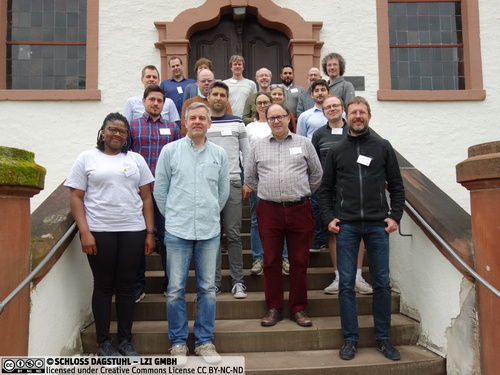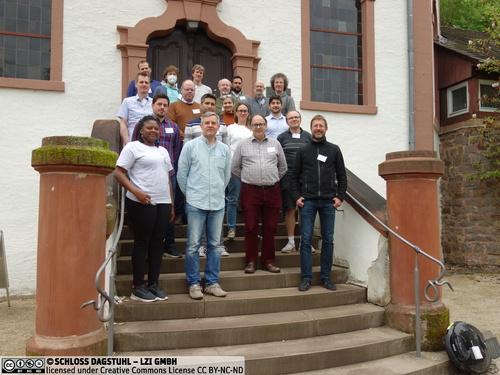Dagstuhl Seminar 22182
Estimation-of-Distribution Algorithms: Theory and Applications
( May 01 – May 06, 2022 )
Permalink
Organizers
- Josu Ceberio Uribe (University of the Basque Country - Donostia, ES)
- Benjamin Doerr (Ecole Polytechnique - Palaiseau, FR)
- Fernando Lobo (University of Algarve, PT)
- Carsten Witt (Technical University of Denmark - Lyngby, DK)
Contact
- Michael Gerke (for scientific matters)
- Christina Schwarz (for administrative matters)
Impacts
- Analysing Equilibrium States for Population Diversity - Lengler, Johannes; Opris, Andre; Sudholt, Dirk - Cornell University : arXiv.org, 2023. - 23 pp..
- Comma Selection Outperforms Plus Selection on OneMax with Randomly Planted Optima - Jorritsma, Joost; Lengler, Johannes; Sudholt, Dirk - Cornell University : arXiv.org, 2023. - 18 pp..
- Universal aggregation of permutation : article - Irurozki, Ekhine; Clemencon, Stephan - Compiègne : Universität , 2023. - 6 pp..
- Explaining a Staff Rostering Genetic Algorithm using Sensitivity Analysis and Trajectory Analysisarticle in GECCO '23 Companion: Proceedings of the Companion Conference on Genetic and Evolutionary Computation - Fyvie, Martin; MacCall, John - New York : ACM, 2023. - 9 pp..
Schedule
The seminar "Estimation-of-Distribution Algorithms: Theory and Practice" on May 2-6, 2022 brought together 19 international experts in estimation-of-distribution algorithms (EDAs). Their research ranged from a theoretical perspective, e.g., runtime analysis on synthetic problems, to an applied perspective, e.g., solutions of industrial optimization problems with EDAs.
The main aim of the seminar was to narrow the gap between theory and practice in EDAs by bringing together researchers from both sides and stimulating interaction. We facilitated this interaction through longer introductory talks, e.,g., on theoretical analyses of EDAs, regular conference-style talks, short flash talks presenting open problems and stimulating discussions and, last but not least, through various breakout sessions and group work. After each talk, we scheduled ample time for discussion, and even adapted the schedule when discussions had gained momentum and took longer than expected. On the last day of the seminar, all participants joined a 1-hour plenum discussion summarizing the findings of the seminar, discussing open problems and identifying further research topics.
We believe that the seminar has achieved its main aims by making a step towards narrowing the gap between theory and practice in EDAs. This is witnessed by the high number of spontaneous talks given by the participants, allowing almost everyone to present his/her perspective on EDAs, high and stable attendance of participants at talks and group sessions, and lively discussions after basically every talk as well as in the dedicated discussion fora. Several participants shared the feedback with us that they learned new aspects of EDAs during the seminar and had increased their understanding of what the other side (theory/practice) was interested in.
The seminar also identified several open problems related to the design, analysis, and application of EDAs. Details can be found in the summary of the concluding plenum discussion (see further below in the report).
Finally, several participants reported to the organizers that the seminar had helped them to understand current challenges in the theory and practice of EDAs, that they had extended their professional network, and drawn inspiration from the seminar for new research ideas. They also expressed interest in attending a similar seminar in the future.
The only downside of this seminar was that several colleagues, most notably from China, could not attend because of the still ongoing sanitary crisis.
 Josu Ceberio Uribe, Benjamin Doerr, and Carsten Witt
Josu Ceberio Uribe, Benjamin Doerr, and Carsten Witt
Estimation-of-distribution algorithms (EDAs) are a relatively recent type of randomized optimization heuristics that iteratively develop a probabilistic model of good solutions in the underlying search space. They thus differ from classical randomized heuristics such as local search, simulated annealing, or genetic algorithms in that they are not restricted to sets of search points as the only mean of carrying information from one iteration to the next. EDAs are successfully applied in various engineering areas. In the last years, they received increasing attention also in theoretical research, pointing out critical influences of their main parameters and rigorously demonstrating situations in which EDAs are superior to many classical approaches, among others, in leaving local optima and in dealing with noise. So far almost all theoretical efforts in EDAs have been done for understanding univariate probabilistic models. The benefits of EDAs, however, are likely to stand out even more if one considers multivariate EDAs, which empirically have been shown to outperform classical evolutionary algorithms on several classes of problems where learning dependencies among decision variables reveals itself to be crucial.
The purpose of this Dagstuhl Seminar is to bring together researchers from the theory and the applications of EDAs. In a small number of survey talks, they will summarize the state of the art in the sub-disciplines with significant recent progress. There will also be a small number of talks discussing in depth recent breakthrough results. A large proportion of the time will be devoted to discussions, both plenary and in small groups. In these, we shall try to clarify how the recent theoretical findings can be used to make EDAs more successful in practice, what experience in practice would be worth making rigorous via theoretical works, and what are the most interesting directions for future research, ideally via combined theoretical and applied approaches.
 Josu Ceberio Uribe, Benjamin Doerr, Fernando Lobo, and Carsten Witt
Josu Ceberio Uribe, Benjamin Doerr, Fernando Lobo, and Carsten Witt
- Carlos Andreu Vilarroig (Technical University of Valencia, ES)
- Mayowa Ayodele (Fujitsu Research of Europe - Slough, GB) [dblp]
- Alexander Brownlee (University of Stirling, GB)
- Josu Ceberio Uribe (University of the Basque Country - Donostia, ES) [dblp]
- Benjamin Doerr (Ecole Polytechnique - Palaiseau, FR) [dblp]
- Nikolaus Hansen (INRIA Saclay - Palaiseau, FR) [dblp]
- Ekhine Irurozki (Telecom Paris, FR) [dblp]
- Ata Kaban (University of Birmingham, GB) [dblp]
- Martin S. Krejca (Sorbonne University - Paris, FR) [dblp]
- Per Kristian Lehre (University of Birmingham, GB) [dblp]
- Johannes Lengler (ETH Zürich, CH) [dblp]
- Manuel López-Ibáñez (University of Málaga, ES) [dblp]
- John McCall (The Robert Gordon University - Aberdeen, GB) [dblp]
- Vicente Perez Soloviev (Polytechnic University of Madrid, ES)
- Jonathan L. Shapiro (University of Manchester, GB) [dblp]
- Thomas Stützle (Free University of Brussels, BE) [dblp]
- Dirk Sudholt (Universität Passau, DE) [dblp]
- Andrew M. Sutton (University of Minnesota - Duluth, US) [dblp]
- Carsten Witt (Technical University of Denmark - Lyngby, DK) [dblp]
Related Seminars
- Dagstuhl Seminar 25092: Estimation-of-Distribution Algorithms: Theory and Applications (2025-02-23 - 2025-02-28) (Details)
Classification
- Artificial Intelligence
- Data Structures and Algorithms
- Neural and Evolutionary Computing
Keywords
- heuristic search and optimization
- estimation-of-distribution algorithms
- probabilistic model building
- machine learning



 Creative Commons BY 4.0
Creative Commons BY 4.0
